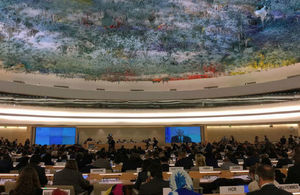World Summit on the Information Society Forum, Geneva
Statement given by Ambassador Julian Braithwaite at the High Policy Session – Digital economy and Trade, 4 May 2016.

The World Summit on the Information Society Forum, Geneva
One essential factor for a successful global digital economy is an open, free, secure and global Internet:
• An open Internet allows “permissionless” innovation. The fact that you don’t need a special licence to launch a new application on the Internet has driven a tremendous technical development in recent years. The Internet was developed on the principle of openness and the success of the digital economy is built on this.
A free Internet has allowed people to communicate and to come together in ways that we could never imagine in years gone by. This has led not only to social benefits but also to new types of economic activity and collaboration.
• A secure Internet is an important and building user trust central to achieve a thriving digital economy. Users need to be sure they navigate in a secured environment and that they can trust the technology they are using. Digital trade can’t exist without the consumer trust. That means all stakeholders working together to tackle cyber-threats and greater capacity-building and awareness raising, particularly in developing countries.
• A global Internet. This is the key to unlocking the economic and development potential of the Internet. It allows access to larger markets for small and medium enterprises or start-ups. The free flow of information online has delivered huge economies of scale and fuelled economic growth. It promotes competition, enabling smaller start-ups to take on bigger companies and to offer new services.
In fact, the only way to grasp all the opportunities the digital environment has to offer is for all stakeholders to work together and be involved. The multi-stakeholder approach is essential.
Governments have an important role in creating an enabling environment. The WSIS Review document sets out the building blocks of these very well (in paragraph 29): “open access to data, the fostering of competition, the creation of transparent, predictable, independent and non-discriminatory regulatory and legal systems, proportionate taxation and licensing fees, access to finance, facilitation of public- private partnerships, multi-stakeholder cooperation, national and regional broadband strategies, efficient allocation of the radio frequency spectrum, infrastructure- sharing models, community-based approaches and public access facilities”.
These building blocks for a prosperous digital economy.
We do need to work together at global level to put in place the enabling environment described in the WSIS review document. The key is to put the economic agenda right at the heart of everything we do on digital.That means working particularly on capacity-building, awareness raising and support for developing countries.
The WSIS review highlighted the progress that has been made, but also the challenges that still face us. There is much more to do to bridge the digital divide and connect the next billion people to the Internet.
This is a particular priority for the UK Mission in Geneva because we believe the international bodies here have particularly important roles to play. The digital agenda is spread across different international organisations. Bodies such as WTO, UNCTAD, CSTD, WIPO and ITU are involved. We need to make sure that all these organisations work hand in hand unlock the enormous potential of a genuinely global digital economy. Coordination and cooperation will be central to achieving a global digital agenda that allow growth and prosperity for all. We hope that the UN Group on the Information Society can continue to play an important role, and the Commission for Science, Technology for Development, which has overall responsibility for WSIS implementation and follow-up.
And that work needs to involve all organisations and stakeholders to ensure that we are harnessing the competence, knowledge and commitment of everyone. That’s also why we value the WSIS Forum, as a platform to share best practice and make sure that we are working together towards our common goals.